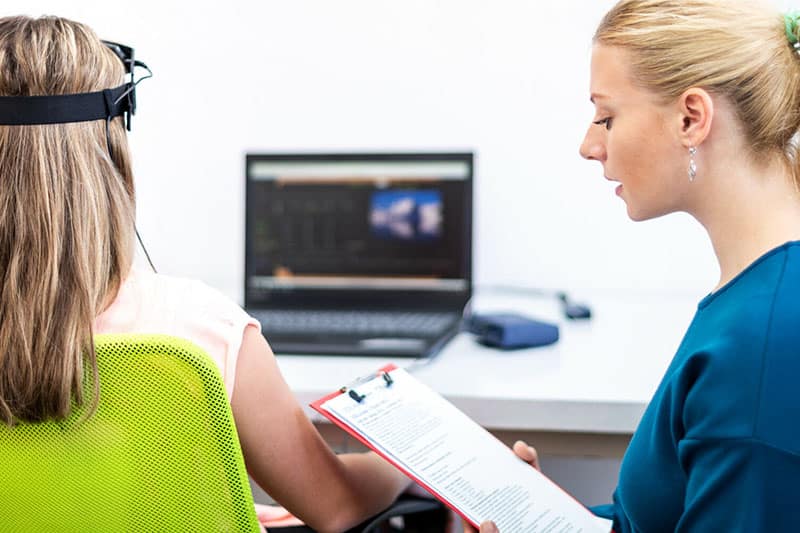Neurobehavioral therapy (NBT) encompasses several neurological rehabilitation treatment approaches to address underlying behavioral disorders. Behavioral Health Centers is one of the few facilities in this country utilizing this revolutionary technology to develop tailored neurobehavioral treatments.
What Is Neurobehavioral Therapy?
With NBT, our team of trained professionals can identify areas of impulsivity, craving and/or anxiety within your brain that can create psychological and behavior problems. These assessment and treatment procedures allow us to create a customized protocol to relax the “excited” areas of your personal brain wave patterns.

Who May Benefit From Neurobehavioral Therapies?
We offer a science-based approach to identifying and treating addictive behaviors as well as some co-occurring mental health issues. Neurobehavioral therapy has been found exceptionally useful in the rehabilitation of patients who have mood disorders, substance use disorder, chronic pain, attention deficit disorder or cognitive performance issues that haven’t responded to other treatments.
One of the things that makes this disorder unique is the extent to which it causes lasting changes in the brain. These changes make it hard for individuals to control the disorder and cause increased vulnerability to relapse.
How Do Neurobehavioral Therapies Treat Underlying Behavioral Disorders?
Our team of psychologists and neuroscientists use neurobehavioral therapy to restore the regulation of neuronal pathways in your brain. This behavior physiological technique identifies brain irregularities that result from substance use disorder. Based on the information gathered about these biological mechanisms, the team creates a precise medical treatment protocol tailored to reset your individual brain dysregulation.
Development of the neurobehavioral treatment plan starts with comprehensive neuropsychological testing. We use quantitative electroencephalography (qEEG), an imaging technology that provides an EEG-based assessment of an individual’s current brain functioning to look for divergence from the typical response. Based on the results, our neurobehavioral specialist may recommend other neurobehavioral therapy modalities, such as:
Biomodulation
Biofeedback therapy is a behavior physiological technique. The special breathing techniques learned through biofeedback modalities can help you voluntarily control HR (heart rate), slow blood pressure, regulate impulsivity and reduce muscle tension.
For example, you can train yourself to increase body temperature, which in turn warms up the muscles and helps them relax. You can also create a basal skin response, which allows you to control sweating as a response to emotional and stressful situations.
Neurofeedback Training
With this technique, you “exercise” your thoughts so you can better control brain activity, which can boost mood and help you avoid brainwave patterns associated with substance abuse. This type of neurobehavioral therapy is similar to working with a trainer to successfully boost physical performance. In this case, however, the trainee practices brain activity to adjust various brainwave patterns and hone the ability to cope with emotional and stressful situations without substance use. Treatment protocols include:
- Heart rate variability
- Bio sound monitoring
- Computerized cognitive brain training
- Transfer of training employing 3rd wave CBT
- Transcranial direct-current stimulation
- Transcranial alternating-current stimulation

What Are the Expected Results of Neurobehavioral Therapy?
In our neurobehavioral therapy practice, we’ve discovered that patients who complete at least one month of a neurobehavioral intervention plan to treat psychological issues have fewer cravings, show better adherence to disorder treatment and stay sober for a longer period of time. Additionally, patients report that NBT reduces post-acute withdrawal symptoms, including both physiological processes and the anxiety and mood swings that occur during detoxification.
We’re at the forefront of using these modern neurobehavioral interventions in a clinical setting, helping provide unmatched results for our patients. The field of neuroscience is rapidly evolving to provide remarkable insights into how the mind functions, especially when it comes to the areas of mental health and addiction. As technology improves and behavioral research gains deeper insights into human brain function, we’re able to use these powerful new insights in neuro-rehabilitation.
Get Help Today
Don’t go through the process of recovery alone. There are people who can help you with the struggle you’re facing. Get in touch with one of our compassionate staff members today at our Port St. Lucie rehab center by calling 855-299-4472.


